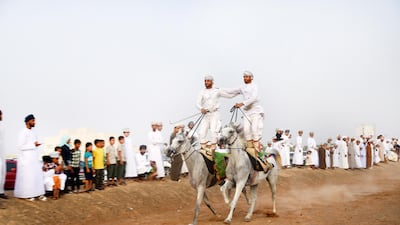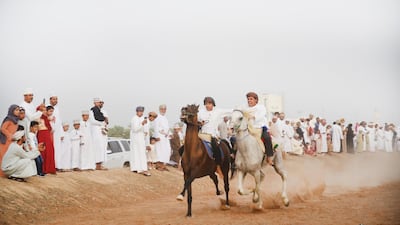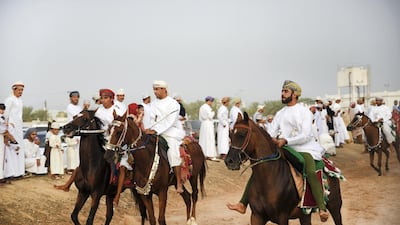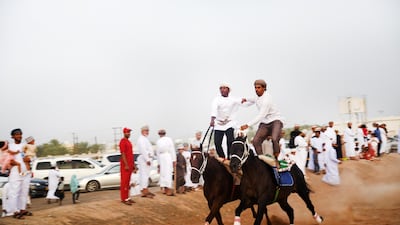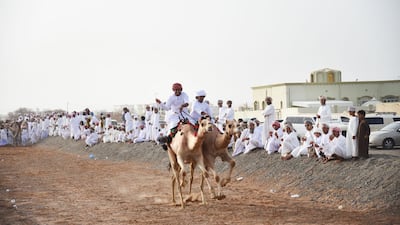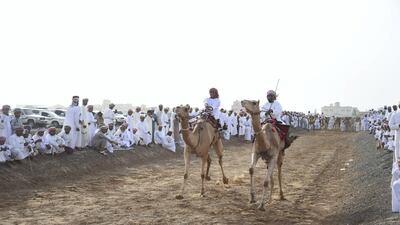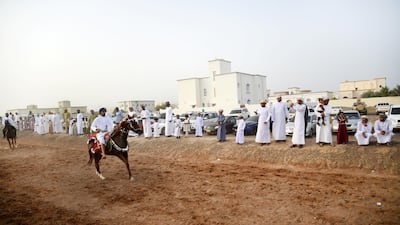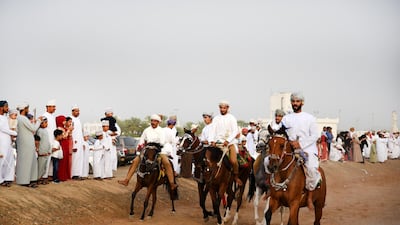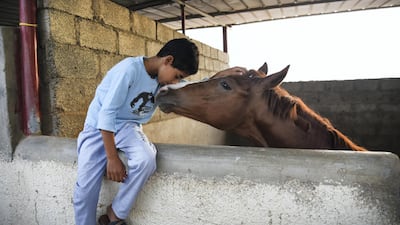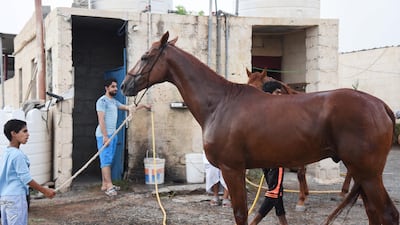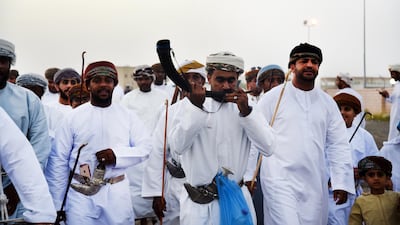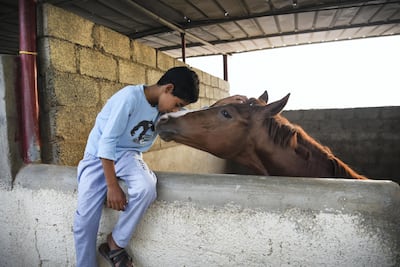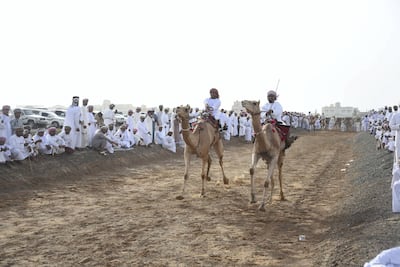The sound of cheering spectators can be heard far from the makeshift racetrack formed out of dirt and gravel.
Two long lines of dark earth stretch as far as the eye can see. On top of mounds that serve as impromptu bleachers, hundreds of people from every part of Oman's Ash Sharqiyah North Governorate have gathered for the kind of traditional event that has been held in this area for generations.
Nearly every man is wearing a crisp white dishdasha with a khanjar, turban and silver belt, the metal gleaming in the afternoon sun. It's a stark contrast to the bright purple, green and blue dresses worn by the women. Older men use wooden sticks to make their way to the top of the mounds to watch. The little ones, like their elder kin, stare spellbound down the track.
Lorries and 4x4s crowd the spaces behind each mound, their seats filled with families, the roofs and bonnets of the cars taken over by children. All eyes drift to the right where more than a 100 camels are gathered, their Bedouin masters choosing which pair will ride next. In those moments, the bellowing of the camels is all that can be heard, quickly followed by their hooves pounding into the dirt and the sound of their riders' sticks. Cheers rise as they pass.
To all those gathered here in the village of Yahmadi, about a two-hour drive from Muscat, these kinds of events are the highlights of the biggest weddings and holidays. For the spectators and performers, they are as much a celebration of the past as they are a way of sharing their heritage with young people and, these days, the world.
As soon as the camels are done, the horses come in, their silver harnesses shimmering as they move down the track. Before long, the steeds are charging in pairs. The cheers, loud and vigorous, are for much more than the spectacle of seeing the horses at full speed or the riders' skills. Like the event itself, locals share a pride in keeping this centuries-old tradition alive.
Each of these public exhibitions offers a glimpse at one of Oman's most prestigious traditions, held in high regard from north to south and east to west. "We inherited these traditions and customs many years ago," says Ahmed Saeed Al Maskari, one of the organisers. "People gather from all the wilayat [provinces] in Ash Sharqiyah. They come for the drums, the horses and the camels. This is an old and renowned custom."
All riders perform for free, he says. No prizes are handed out either. It’s a celebration, the pride of performing outstripping anything else. Those watching now could one day be the next batch of riders, carrying a torch that was first lit many generations ago.
That is a sentiment Mohammed Malik Al Maskari, 24, one of the horse jockeys, happily shares. For him, it was a passion for horses that first led him to ride. It's a fire that still burns strongly nearly 10 years later. "I love horses a lot," he says. "My heart is very passionate about them. Our love of horses has been with us since the time of our ancestors. It is something the older generation inherited from them. It is something that was passed down to us, the youth. God willing, this passion will be with us for a very long time."
Thankfully, the young rider does not have to look far to see why the future of this traditional pastime is so promising. Riding alongside him, his 10-year-old nephew Muatassim is the perfect example of just how deep that passion runs. The boy astounds everyone as he controls his horse, Bint Al Reef, as it thunders across the track. And just like his uncle, he beams while talking about horses – especially his beloved mare who he proudly calls his friend. That kind of relationship is built on trust, hours of feeding and companionship.
Horses are like humans, Mohammed says. They have their own feelings and emotions. Understanding that is crucial to performing well in the saddle. It is that trust that allows them to ride with ease, to grin as they race down the track and even perform stunts while hardly breaking a sweat.
The riders reach out and grasp one another as they move at top speed. The most skilled of them even stand on their horses. There is no doubting the effort and skill on display, nor the joy of the riders, judging from the smiles on their faces. "We do it because we want the name of our village to be high and to continue our tradition," says Fahm Al Maskari
. "This is something we organise for weddings and big celebrations. We don't charge money. We do it out of love." In all, around 40 horses and 120 camels race in Yahmadi. Drums beat as the sky begins to darken, the last of the riders performing a few more tricks before the crowd heads home.
At dusk, the drum-beating troupe are dancing from the track back to the village, serenading the horses, cars and passers-by. It is, for many, a moment when past and present collide, their songs and drums a homage to their forebears and the promise of tomorrow.
